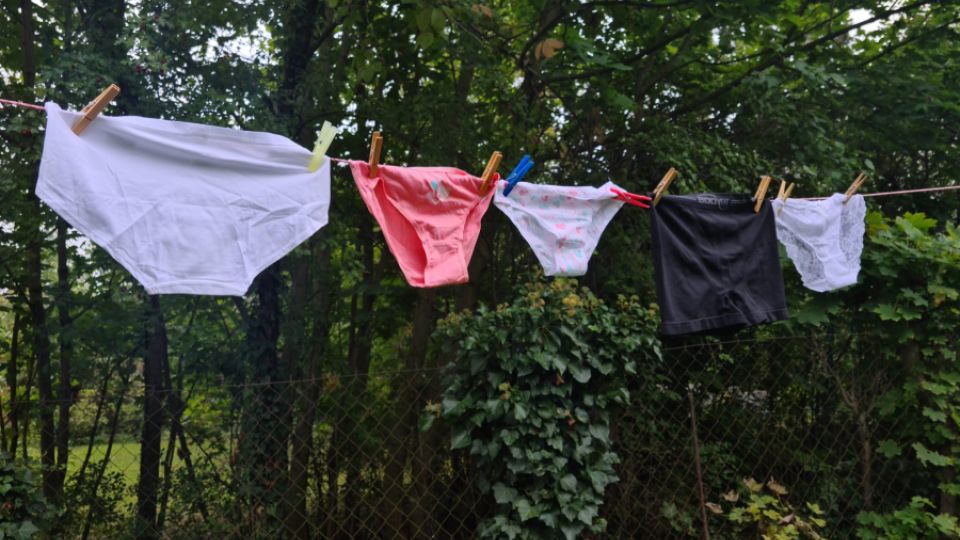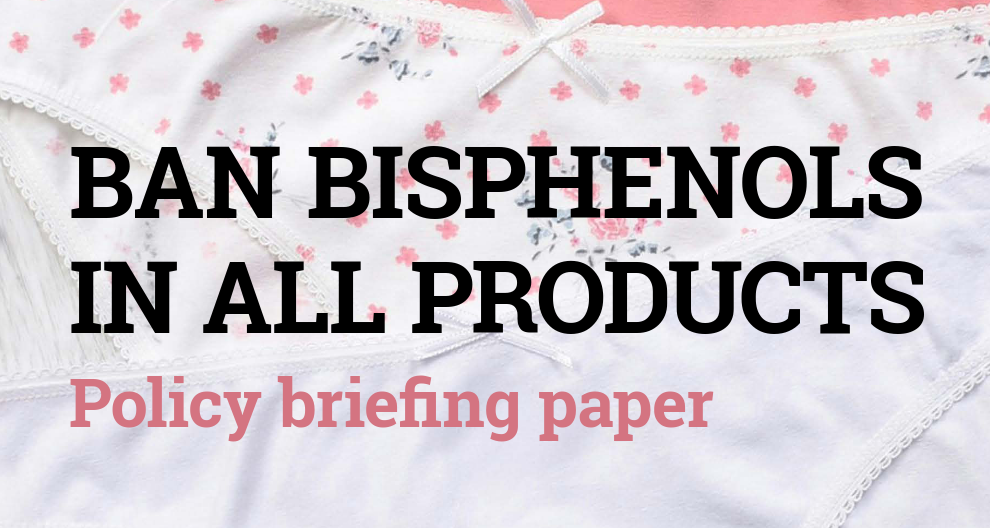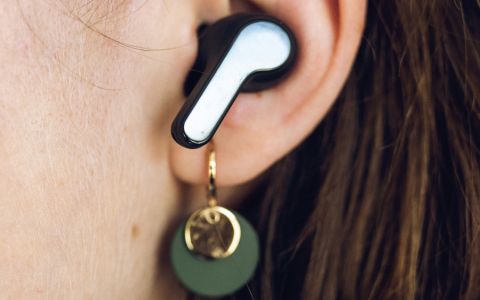The recent news about the presence of dangerous bisphenols in textiles, particularly women's underwear, has prompted several European NGOs and consumer groups to call for a rapid, EU-wide ban on the substances. In their new policy paper, organisations from Austria, the Czech Republic, Hungary and Slovenia, including the Czech NGO Arnika and dTest, warn that the presence of endocrine disrupting bisphenols in about half of the lingerie tested poses an unacceptable threat to public health, with ordinary consumers having very limited means to protect themselves without adequate systemic regulation.
Earlier this year, researchers found that of 166 samples bought in five European countries (Austria, Czech Republic, Hungary, Slovakia, Slovenia), around 33% contained detectable levels of bisphenols, with 10% of samples exceeding scientific safety limits. One of the products bought in Austria contained a bisphenol concentration more than 350 times higher than the European Union's safe limit for consumer products (0.8 mg/kg). Women's underwear is the most problematic, with up to 50% of samples containing bisphenols, including products marketed towards young girls.
The gendered difference in bisphenol concentration is due to the typical materials used. The research showed that products with a high cotton content performed best, regardless of brand, while synthetics, especially polyamide and polyester, were much more likely to be full of bisphenols on average. Counter-intuitively, products from well-known brands performed worse on average than those from budget stores. Some synthetic fiber products showed no traces of harmful chemicals, but experts point out that the average consumer has no realistic means of assessing the risk. So, the widespread use of bisphenols in textiles remains a significant health threat.
"In the Czech Republic and across Europe, there are already steps to limit bisphenols in consumer products, such as a ban on their use in baby bottles. But this is not enough. Widely used bisphenol A is still being replaced by less studied and often similarly toxic substances, such as bisphenol S or F, which can be just as harmful. It is therefore necessary to adopt a wide ban on the entire group of bisphenols at the European level. At the same time, we need to regulate other harmful chemicals in all product categories that accumulate in the environment and have long-term effects on human health and ecosystems," says Karolína Brabcová, an expert on toxic substances in consumer products at Arnika.
Read the whole policy paper ‘Ban Bisphenols in All Products' HERE
Bisphenols are known to disrupt endocrine systems, with potential consequences for reproductive and developmental health. Their presence in clothing is all the more problematic as scientific research has shown the presence of the same hazardous substances in other everyday products, such as packaging materials, kitchen utensils, and even toys.
The current policy paper, presented by organizations dedicated to protecting consumer rights, calls on EU lawmakers and regulators to take swift and decisive action. Arnika and dTest (the Czech Republic), ZPS (Slovenia), VKI (Austria), and Association of Conscious Consumers (Hungary). They advocate for stronger regulations and greater transparency in the textile industry, emphasizing that such measures will help ensure a safer and healthier future for all Europeans, particularly the most vulnerable groups.
In response to the alarming findings and the known risks, the organisations are advocating for an EU-wide ban on bisphenols and their derivatives with endocrine, reproductive, or sensitizing properties in any kind of products by 2029. Their proposed measures also include:
- Increased transparency within the EU through the introduction of a Digital Product Passport to provide consumers with detailed information about the chemical content of their clothing.
- The inclusion of bisphenols as a group in the Global Plastics Treaty's phase-out list to ensure that plastics are produced without toxic additives including those with endocrine disrupting properties.
- Stricter ecolabel certification standards to ensure that clothing labeled as environmentally friendly does not contain harmful substances.
- Mandatory pre-market testing for chemicals used in textiles, along with clear labeling of products containing harmful chemicals.
- Public awareness campaigns to inform consumers about the risks associated with bisphenols and to encourage safer product choices.
"Europe should be at the forefront of protecting public health and the environment, and strict regulation of harmful substances is a step in the right direction. The restrictions shall cover all the sources of exposure right at the source. This often includes not only consumer products but also many other industrial applications, which the EU legislation should also consider. A wide ban within the current REACH regulation is a right step forward," adds Brabcová.
Simultaneously with the bisphenols testing results release, the participating NGOs initiated a call to action called ToxfreeProductsNow!, which has been signed by over 4800 consumers from participating countries. Consumer interest in healthier products is clearly there. This study also included a survey of over 2,200 Europeans, which revealed a general concern about the presence of harmful chemicals in products. It found that an overwhelming majority of respondents support stricter regulations to limit the use of toxic substances in products they use every day, with a clear demand for more transparency and information. A significant number of respondents also said that if they were informed about toxic chemicals in a product, they would avoid buying it.
The long-term problem, however, is that the entire regulatory system does not work in favour of public health protection. Experience shows that it can take up to 6 months for manufacturers to bring a new chemical onto the market. On the other hand, if these substances are found to be harmful, it takes an average of 20 years to ban them from the production of consumer goods.
The research that prompted the current call for a ban on bisphenols was conducted as a part of the ToxFree LIFE for All project. Participating organisations – Arnika (the Czech Republic), ZPS from Slovenia, VKI from Austria, Association of Conscious Consumers from Hungary, and dTest from the Czech Republic – are dedicated to reducing consumers’ exposure to various harmful chemicals. The ToxFree LIFE for All project is funded by the European Union's LIFE programme. It aims to protect public health and the environment from the risks of harmful chemicals in everyday consumer products.
For more information, please contact Arnika’s international PR officer, Jan Kašpárek: +420776529296 / This email address is being protected from spambots. You need JavaScript enabled to view it.

Funded by the EU Life Programme (LIFE22-GIE-HU-ToxFree LIFE for All, 101114078) and the Ministry of Environment of the Czech Republic. Views and opinions expressed are however those of the author(s) only and do not necessarily reflect those of the European Union. Neither the European Union nor the granting authority can be held responsible for them.








